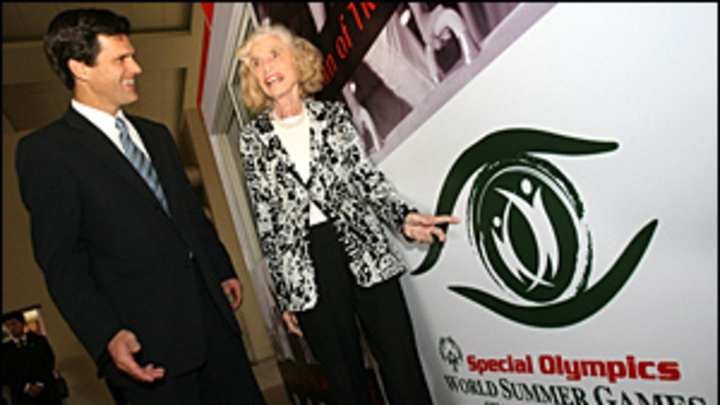My Sportsman: Eunice Shriver


Sports Illustrated will announce its choice for Sportsman of the Year on Dec. 3. Here's one of the nominations for that honor by an SI writer. For more essays, click here.
The name of my Sports(wo)man of the Year does not appear regularly, or even sporadically, on this web site, in the magazine or in any other sports publication. In fact, the movement she started four decades ago regularly causes consternation in the nation's sports departments. How do we cover it? Is it sports? What do we say about it?
Legit questions all. But in 1968, Special Olympics was born and -- no matter what else it might be -- it is a sports movement that not only endures, but also flourishes in a world obsessed with deifying elite athletes. And so I choose 85-year-old Eunice Kennedy Shriver, the founder and still guiding light of Special Olympics, as my Sportsman of the Year.
There is a place for celebrated athletes in Special Olympics: in the background along with thousands of other volunteers. Athletes and celebrities of all stripes can lend their names, their time and their money -- hundreds and hundreds of them have over the years -- but Special Olympics remain about the competitors.
I was at the Special Olympics World Games in Buffalo a number of years ago when a famous athlete was introduced. He raised both hands to acknowledge the roar, then sheepishly put them down when he realized the crowd was actually cheering the start of the 100-yard dash. That it took the winner about 25 seconds to finish was irrelevant.
Two years removed from a small stroke, and still battling health problems -- Ms. Shriver, 86, was recently admitted to a Boston-area hospital with an undisclosed illness -- the fifth of nine children in America's enduring First Family remains the Rushmore-ic face of Special Olympics, which serves about 2.5 million boys, girls, men and women in 165 countries. Soccer may be the world's sport, and basketball may sell more jerseys, but Special Olympics is just as global.
There are 500,000 Special Olympic athletes in China and 210,000 in India, plus an astonishing 4,400 in Rwanda. There is simply no telling how many intellectually-challenged children in the United States -- never mind the Third World or kids who were born under repressive regimes -- would have been tossed onto life's scrap heap without a reason to run and jump and sweat and ski and pass some inner gut check. Hundreds of thousands, maybe millions.
Special Olympics is a sports movement utterly without cynicism. Even The Ringer, the movie about it that Hollywood's gross-out kings, the Farrelly brothers, made was, in its own way, touching. I've been involved in Special Olympics as a journalist, volunteer and state board of director. To be involved is to be touched.
The executive director of Pennsylvania Special Olympics, Al Senavitis, is one of the best all-around athletes I've ever known. He was a star basketball player at Seton Hall, a state triple-jump champ, an ambidextrous masters tennis champ. Yet, he has remained in his salary-free position for over two decades. "It means something," he says with a shrug, "and a lot of sports don't."
I met Ms. Shriver once, three decades ago, when she presented me with an award for a Special Olympics story I had written for a newspaper. I listened as she told her breakfast guests how she grew up as a competitive athlete in a competitive family, always playing quarterback against her brothers Jack and Ted in family two-hand touch football games. Partly motivated by her sister Rosemary, who was born with mild mental retardation (Rosemary died in 2005), Eunice, a populist who wanted nothing to do with the trappings of wealth, took that famous Kennedy drive and created something real and lasting.
The best thing about Special Olympics is that, somehow, it has everything to do with the world of real sports and nothing at all.
Agree with this selection? Give us your pick for Sportsman here.
